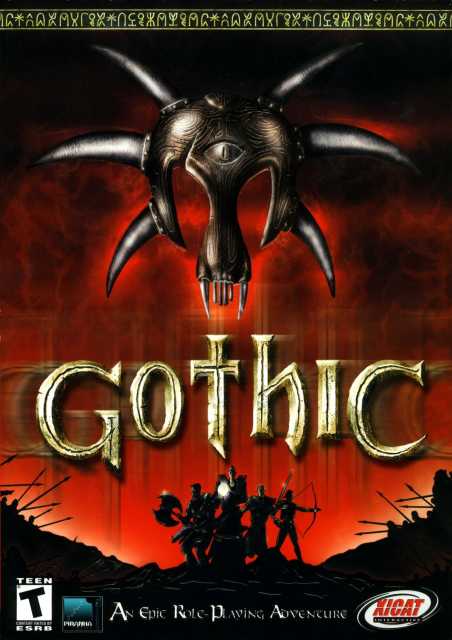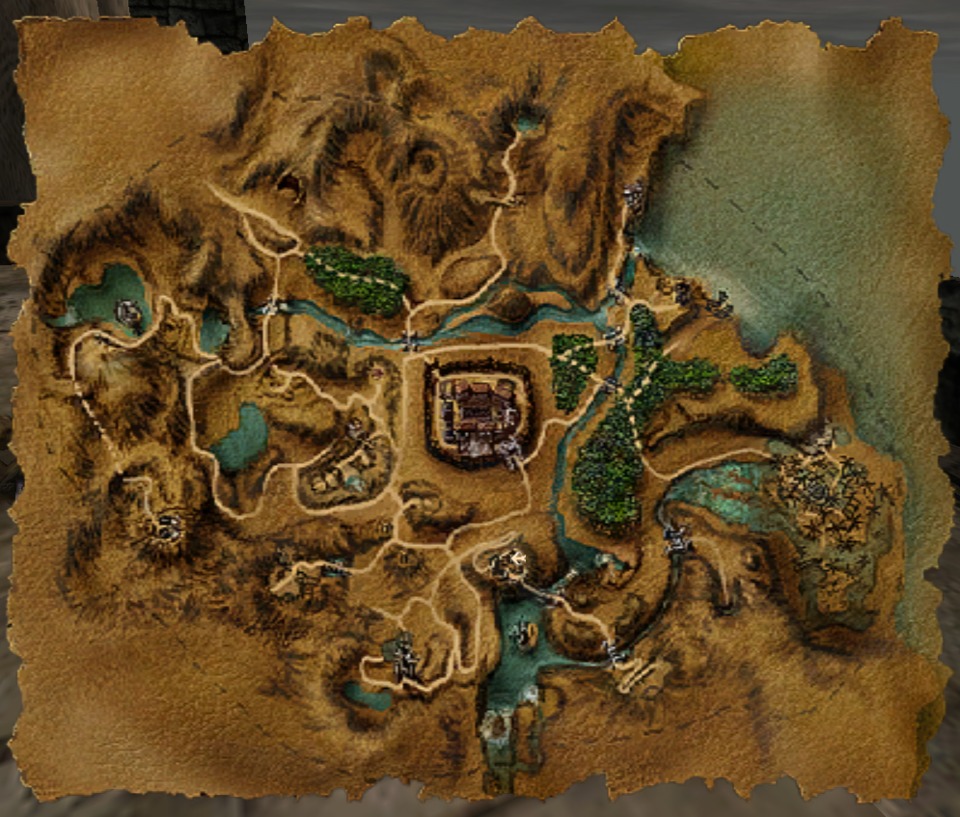
What I admire most about Gothic, besides the usual moxie of European CRPGs that charmingly overreach, is how it feels constructed by those who understand how to build an RPG world, possibly from years spent poring over D&D rulebooks or reading a lot of fantasy fiction. Specifically, someone who puts story and characters ahead of mechanics and loot, which is so rarely the case even in a genre that supposedly showcases those talented in constructing the former. I don't have an issue with generic RPG plots, and I'm not going to say that Gothic doesn't have its share of common tropes, but there's a logical consistency to its otherwise unusual setting and a consideration put into creating its three act structure that feels refreshingly uncommon.
To focus on this aspect for a moment, I summarized the game last time as being set within an enormous magical dome that covers about a square mile of territory. The dome was constructed to house a prison colony, replacing the usual cells and shackles: no-one can leave the dome once they enter it, but are afforded some amount of autonomy once inside. The hero is thrown into this enchanted oubliette several years after it was created, and quickly acclimates to the various factions: one group has set themselves up to deliver the ore they were meant to be mining as a punishment for their crimes, living off the goods the King sends their way as recompense; one seeks to dismantle the shield with a bold scheme so they can escape; and the third have taken to sitting around smoking pot in a swamp while worshipping an entity they call the Sleeper. The first "act" of Gothic revolves around completing quests for the various factions to earn their trust, befriending various figures and making uneasy alliances with others, and ultimately deciding which of the three to side with for the long-term. This choice seems like the most significant one initially, though it later becomes immaterial as the thrust of the game's story kicks into high gear and various incidents follow one after the other as the player's questing grows ever more linear.
The game has one of my favorite narrative devices which I call "pulling the tablecloth", where you spend a considerable amount of time early on in a period of relative stability that allows the game to establish its world, inform the player of its rules (both in narrative and mechanical terms), and develop meaningful if not always pleasant relationships with the game's many named NPCs. There's around twenty in the Old Camp alone, each with a specific role in the camp, a personality which can be accommodating or hostile, and a series of interactions with the player that can eventually result with anything between antipathy and friendship, though very few of these NPCs are ever all that critical to the story. Instead, you build up a rapport with these named characters and complete side-quests on their behalf, all the while learning the ropes of the power structure within the Old Camp - diggers are the lowest tier, basically performing the same hard labor they would've been doing as prisoners; shadows are the merchants and agents and the first step to being a "made man"; and the guards are at the top of the pile with the best armor and weapons (and the other two camps have similar hierarchies that you work your way up). It's due to all this meticulous worldbuilding that the prison colony feels like a lived-in world that operated just fine before your involvement with the story, and that makes it all the more compelling when your actions and other coincidental events suddenly cause this equilibrium to shift dangerously. The Old Camp loses its mine and becomes more aggressive with its rivals, the New Camp is on the cusp of attempting their escape plan which is actually doomed to fail, and the Sleeper deity that the Swamp Camp is praying to is actually a centuries-old archdemon who has been long trapped between its reality and ours. The tablecloth is summarily whipped away, disturbing if not outright destroying everything that had been carefully stacked on top.
It also makes it all the more impactful when you hear that a named NPC has died, or that a familiar location has suddenly vanished. The colony's a small place where word travels fast, so even while the player might be exploring one of its more remote corners - there's no shortage of dungeons in this mile-wide bubble - events are moving forward all the time. Revelations come to light, alliances shift, and the primary objective of "find a way to escape the prison colony" becomes ever more obfuscated. Add to this the very deliberate difficulty curve of the game, where areas are gated off not by walls or locks but by an enemy progression that quickly teaches you to be wary of any creature you've not seen before: chances are, you won't be able to handle it for a while. Completing quests gets you promotions within the factions, which in turn grants you improved gear that makes a significant impact on your survivability. It then becomes something like a puzzle game: can I access this area now? Do I still need better gear, or is it simply a matter of skill to eliminate the beasts in this part of the map? What skills should I be prioritizing first, melee or ranged or magic? Joining a camp and earning that first tier's armor meant so many more enemies that were once instantly fatal could now be conquered, and that in turn greatly expanded how much more I could do. Gothic doesn't have a huge world, but it feels much bigger when you're regularly poking at the corners of your limits and discovering the scope of the progress that was suddenly now possible.

There's still the matter of the lousy combat - I got the hang of it eventually, but so much of the timing is still deeply temperamental - and the general ineffectiveness of bows and crossbows when they barely slow down a charging enemy. Magic is much more effective for stun-locking foes, which makes it all the more annoying when it's used against you. I loved the dorky voice-acting, though perhaps not in the way it was intended to be received; everyone had these... what I can only really describe as "radio announcer" voices, which were well enunciated and delivered but lacked much in the way of emotion and were spoken in a mix of bizarre, affected American accents. I thought it was decent-looking, but then I was playing with the Gothic ½ System Pack fan patch that fixes a lot of issues and includes modern resolution options. The game's overall jankiness is still a sticking point, with NPC pathfinding being particularly broken, but most of these issues were either funny or inconsequential or both so I wasn't too bothered by it. The lack of any auto-saving was a bit more of a nuisance, but not if you train yourself to save constantly, especially if you're about to fight something or sneak into someone's cabin for some quick thievery - it's one of the oldest rules of CRPGs, after all.
What has allowed Gothic to stand the test of time isn't its combat mechanics, or its visuals, or its voice acting, or even the carefully gated exploration. That much was made evident enough with this playthrough where I struggled through half of it in order to see what was over the next hilltop. What does make Gothic timeless is that aforementioned excellent worldbuilding and story progression, where it effectively weaves the illusion that you've entered and subsequently futzed around with a living world that has responded to your presence, whether that's annoying the wrong NPC or throwing the balance of power into disarray by helping one of two sides. Gothic learned perhaps the best lesson set forth by the Ultima Underworld games: it's not enough to craft a world in a level editor with all the necessary flags and scripts, but to take the vital narrative steps to make it feel real. To have visible power structures, or a society that has an evident if not necessarily signposted means of supporting itself, or characters with clearly defined roles within that society. People with personalities that range from obnoxious to affable to openly hostile based on how they perceive you. It's a tough act to pull off, but Gothic's dome-like setting and the way it keeps the world compartmentalized helps considerably in this regard.
I'll be interested to one day find out how Gothic II fares without this dome (sorry, spoilers, you remove it and escape) and moves ahead with many of the original game's characters, and I'd like to keep digging deeper into the various connections this series has with its successor franchise Risen. For now, though, May Millennials has at least one more game to complete this month.
Log in to comment